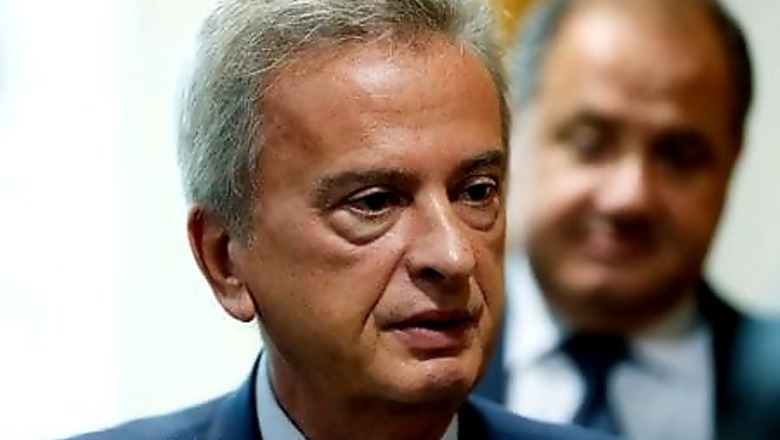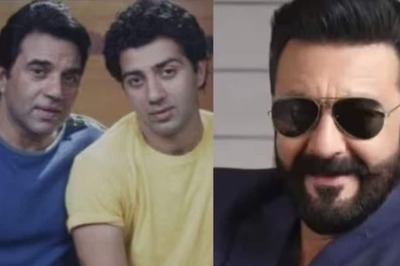
views
LONDON/BEIRUT: Bankers and analysts have voiced scepticism about attempts by Lebanon’s central bank to clean up the country’s banks, warning they must form part of a wider rescue plan to fix its broken financial and economic system.
In a series of circulars on Thursday, the central bank told domestic banks to raise fresh capital, urge their big depositors to move funds back to the country and provision for a 45% loss on their Eurobond holdings.
The move follows a further downward spiral in Lebanon’s fortunes since an explosion this month at Beirut’s port. Even before the blast, which led to the government’s resignation, Beirut was grappling with its worst financial crisis in the wake of protests and a default on its foreign currency debt in March.
“These ad-hoc policy decisions will add to Lebanon’s credit and banking woes and risk undermining the little progress made in talks with the IMF,” said Alia Moubayed, managing director at Jefferies, referring to already stalled negotiations with the International Monetary Fund over a bailout.
“Nor are they anchored in a revised macro-fiscal and debt restructuring plan that factors in the deteriorating socio-economic context and worsening debt dynamics after the blast.”
The bank’s initiative comes ahead of a visit next week by French President Emmanuel Macron, who is pressing Lebanese leaders to make political and financial reforms to unlock foreign aid and ease the economic crisis, including by making a full audit of state finances and the central bank.
Lebanon’s banks, at the centre of the crisis because of their large holdings of the government’s debt, were told by the central bank to raise their capital by 20% by the end of February 2021 or leave the market.
REFORMS
“The necessity to have a cleaning in the banks after the default is there because we want banks to resume their role and activity,” Central Bank Governor Riad Salameh told Reuters when asked about the purpose of the circulars.
But lenders wouldn’t be able to resume activity without sufficient funds with their correspondent banks, he said.
Several analysts reacted cautiously.
“It is difficult to see why the private sector would pump fresh equity capital into the banking system unless a full asset clean-up has first taken place,” said Rahul Shah, head of financials equity research at Tellimer.
Analysts also questioned how the requirement for banks to take a 45% loss on Eurobond holdings tallies with a rescue plan released earlier this year by the now-caretaker government that proposed 75% haircuts on external debt and 40% on domestic debt.
The 45% loss also does not reflect the current market value of the bonds, which plummeted deeper below 20 cents in the dollar on Thursday, in the wake of the circulars and comments from French government officials that aid will not be forthcoming without reforms.
“We do not know how the negotiation between Lebanon and the creditors will end up but we have taken the normal provision that follows such a default,” Salameh said, adding the 45% level could be readjusted “in both ways”, depending on negotiations.
The provision level could signal a desire to pursue smaller haircuts or treat bank holdings differently from foreign holdings of Eurobonds, said Patrick Curran, senior economist at Tellimer.
Banks were told that the provisions, which also included a 1.89% loss on their hard currency deposits with the central bank, should be in place within five years, but were extendable to 10 years with the approval of the central bank.
The timetable was likely an effort to ensure that banks, already struggling to remain solvent, did not flout international regulatory capital floors, said analysts.
“It’s camouflage,” said a former senior central bank official. “They’re trying to dress things up, to put a fresh coat of paint on a crumbling building.”
There was also wariness about attempts by the central bank to require large depositors to return some of their funds from overseas, with analysts viewing it a precursor to some depositors having to share financial losses.
INCENTIVES
Banks were told to urge depositors who transferred more than $500,000 abroad as of July 1, 2017 to deposit funds in a special account in Lebanon that will be frozen for five years and would be equivalent to 15% of the transferred amount. The equivalent deposit amount is raised to 30% for “politically exposed persons”.
The directive was causing panic among some bank customers with large overseas holdings, said one financial services source, while other industry sources questioned what incentives would be offered to convince people to return funds.
“This is not the right way to do things,” said the financial services source. “The government, not the central bank, has to take decisions on this as this is a legal issue.
“Asking normal citizens to transfer some of their money back doesn’t seem fair, and if there is concern about politically exposed persons then an audit should first be carried out on their accounts to determine if they’ve benefited from financial engineering.”
The source was referring to a practice of Lebanon’s central bank that involved siphoning dollars from local banks at high interest rates to keep the government’s finances afloat.
(Additional reporting by Tom Perry in Beirut; Editing by William Maclean)
Disclaimer: This post has been auto-published from an agency feed without any modifications to the text and has not been reviewed by an editor



















Comments
0 comment